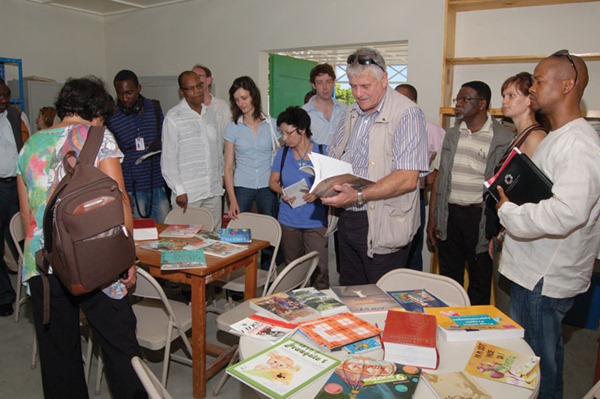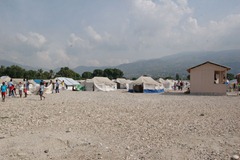Hope for Haiti: Jim Nicholson’s visit
There are tough times ahead for Haiti but there are also glimmers of hope, according to Jim Nicholson, who has travelled to the country. Emma Blee reports.
“Nothing prepared me for what I was faced with in Haiti. I have never seen such devastation before,” said a vexed Jim Nicholson just days after he returned from the quake-stricken country.
The Armagh-born MEP co-chaired and led a delegation of parliamentarians from Europe, Africa, the Caribbean and the countries of the Pacific to observe the reconstruction work that is taking place in Haiti, following an earthquake in January.
Nicholson was appointed vice-chair of the Africa Caribbean Pacific (ACP) – European Union Joint Parliamentary Assembly in July 2009. A report will now be drawn up on the findings and will be presented to the European Union in Brussels and the leaders of the ACP Assembly.
He said the biggest shock of the trip was the magnitude of temporary housing: “As you fly into Port-au-Prince you can see the acres and acres of tents where people are living now.
“Every inch in front of the palace, every part of every football pitch and every bit of ground has been taken up by a tent. Words in the English language cannot explain it.”
A few months ago there weren’t enough tents to go around and thousands more had to be shipped in from the military in Afghanistan. While most people in Haiti now at least have basic accommodation, there are “major concerns” about those living in tents as many are placed on low-lying land and a hurricane or flooding would completely wipe them out.
Nicholson explained that there are problems with growing violence in the camps, especially against women. “We learned in our discussions with NGOs that there are concerns about people trafficking, especially young females who have been trafficked out of the country and into prostitution,” he added.
There is also a “huge problem” with orphans as there is no process set up for assigning orphans to families, despite many people wanting to adopt.
The most visible reminder of the earthquake is the rubble. “As you drive around, the thing that hits you is that for maybe 100 metres, everything is wiped out and if you look down the road for half a mile, everything is wiped out,” he commented.
By some estimates, the quake left about 33 million cubic yards of debris in Port-au-Prince. So far, it is thought that only about 2 per cent has been cleared. It has been difficult to remove the rubble as heavy equipment has to be shipped in by sea and dump trucks have had difficulty navigating narrow dirt roads.
So far no single person in the Haitian Government has been declared in charge of clearing the rubble so NGOs have taken on the task themselves.
Another worry for the people of Haiti is the imminent presidential and parliamentary elections. Initially, the election was due to be held on 28 February but was postponed due to the natural disaster and will now be held on 28 November.
“If you look at the past history of Haitian elections, it has normally been very bad. Political turmoil, often accompanied by violence, has been the rule rather than the exception ever since the country’s inception and that certainly gives some cause for concern,” Nicholson remarks.
However, he said that while people are worried about the elections, they want political stability. “When I asked the question, do these people really need elections now? The answer I was given was that they don’t, but the situation could be much worse if they don’t have one.”
Positive
Despite local people being subjected to poverty, instability and violence, Nicholson said he was “flabbergasted” by their positive attitude.
“The people were so pleasant and the way in which they came out of these tents was amazing. They were dressed perfectly, totally shining and clean. When they greet you they have smiles on their faces and that’s what I found to be the most exciting thing,” he commented.
He said a visit to a camp where houses were being re-built also instilled hope: “I went to one of the camps which is under reconstruction and they have got wood in from the United States and they are employing local Haitians to put together these houses. It was a sign that things were starting to take shape but there is still a lot to be done.”
After surveying the situation, Nicholson is hopeful that EU members and other countries can help to piece Haiti back to normality.
One of the biggest problems is that Port-au-Prince is becoming over-populated. He explains that there is a need to “decentralise” and to build new roads so that people will spread out to other parts of the country.
“The EU is building one road and has already spent more than £40 million. We’re going north towards the Dominican Republic and the United States is building up a road to the West by the sea, where they hope to create a whole area of tourism.”
Nicholson said education is one of the “key factors” in rebuilding Haiti. During the trip he visited a school where the EU is paying for young people to train as teachers. They will then go back into their communities and set up a school. “What we’re trying to do is bring education to all these people and the only way to do that is to bring it to the rural areas,” he said.
The group of delegates have decided on a number of recommendations that they will report back to the EU and ACP. Nicholson said he would like to see three major changes:
• Better co-ordination of aid workers;
• More support for the EU mission in Port-au-Prince;
• An observation team to monitor the elections in November.
He added: “Haiti is already getting a substantial sum of money and it is making sure that money is spent as wisely and as best as possible.”







